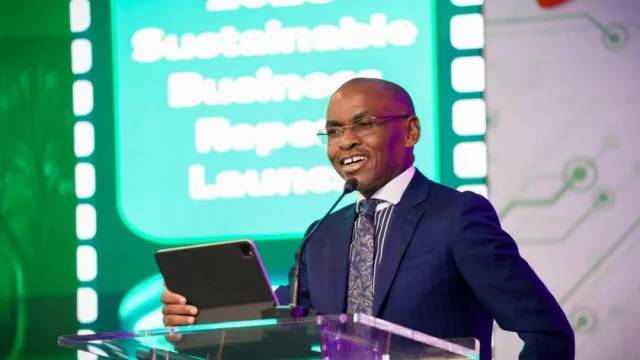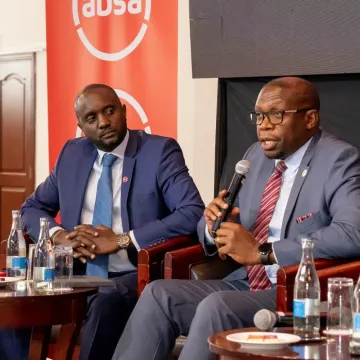Safaricom’s impact in economy and environment crosses Sh1 trillion

Safaricom PLC CEO Dr. Peter Ndegwa during the release of the telco's 14th Sustainable Business Report.
Regional tech giant Safaricom PLC has reported a true value of KES1.1 trillion for the fiscal year 2025. According to the company’s latest annual Sustainable Business Report, the telco contributed KES809 billion to the country's GDP across its value chain.
In an update on Tuesday, Safaricom said the increase in the True Value earnings was attributable to its enhanced value created for customers, agents and merchants through fintech arm M-PESA, as well as via heightened investments in corporate social investments
What's more, the firm's growth in CAPEX and OPEX economic impact during the financial year contributed to the trillion shillings' impact. OPEX, or Operating Expenditure, refers to the ongoing, day-to-day expenses a business incurs to maintain its operations and generate revenue and is distinct from CAPEX (Capital Expenditure), which involves long-term investments in assets such as equipment or property.
Impact beyond financial returns
True Value is a comprehensive assessment of a company's total impact beyond financial returns, a measure which cuts across a company's economic, social, and environmental contributions to the economy.
It quantifies the externalities both positive and negative generated by operations, allowing businesses to understand how to create both corporate and societal value, enhance stakeholder relationships, and make data-driven decisions that promote a more resilient and equitable future.
“Over the past 25 years, Safaricom has evolved into a purpose-led technology company guided by one simple mission: to transform lives by connecting people to people, people to opportunity, and people to information. At the heart of this journey is sustainability, embedded not as an obligation, but as a business imperative. Now in our 14th year of publishing our Annual Sustainable Business Report, we continue to hold ourselves accountable, using the Sustainable Development Goals as our blueprint for impact,” said Dr Peter Ndegwa, CEO, Safaricom PLC.
The report themed “Anchored on Purpose, Accelerating a Digital Future” showcases how Safaricom leverages innovation, partnerships, and technology to create meaningful impact, connecting communities, enhancing education, improving healthcare, and driving financial inclusion.
On Environment, the report notes that Safaricom planted over 830,000 trees, helping the country to restore roughly 694 hectares of forest spanning across eight counties even as it rolled out a 15Km fencing project in Kakamega forest. This greening effort saw the company engage over 4,000 community members in FY 24/25 alone.
"Cumulatively, we have grown 2.3 million trees against a target of 5million by 2030," the report notes in part.
Additionally, the telco claims that it achieved a 99 percent recycling rate, collecting and recycling 190 tonnes of electronic-waste and 62 tonnes of plastic waste through M-PESA Green Points.
Digital inclusion
Through various digital inclusion initiatives, Safaricom powered increase in smartphone ownership, driving up handsets in the network to 27.37 million from 22.93 million. What's more, digital drive saw up to nine early-stage startups supported through training and mentorship under the Spark Fund Accelerator Programme.
"Smartphone ownership increased from 44 percent [in FY24] to 50 percent, driven by Lipa Mdogo," Safaricom said.
For smart farmers spread across the country, the report shows that a total of KES945 million in credit was disbursed across 169,000 loan applications, enabling growers to access for inputs and relevant services in time.
Over the said borrowers, Safaricom said 36 percent of the recipients were women, while 17 percent were youth, reflecting the company's push to help the marginalised access equal growth opportunities.
Under the telco's diversity equity and inclusion programs, disclosures show that Safaricom now enjoys 51 percent male and 49 percent female representation across its employee cadres, with women having a 45 percent representation in its senior leadership posts.
Persons with disabilities
Additionally, diversity push has benefited persons with disabilities, who now constitute 3.6 percent of its workforce.
"For our customers we are using AI to deliver personalized offers that speaks to them at a given time. This led to15.2 percent year-on-year growth in mobile data revenue and a 14 percent increase in usage per customer."
During the year under focus, Safaricom was awarded the ISO 2770- the highest certification in Privacy Information Management System (PIMS), a pointer to the telco’s dedication to safeguarding customer data across its GSM and M-Pesa services.
At the same time, the company rrecorded 87 percent fraud reduction through use of AI systems that has helped narrow down on fraudsters, who leverage social engineering to attack subscribers.
"On anti-money laundering we detected poaching activity and associated revenue flow through M-Pesa. 14 poachers identified and reported to financial reporting center," the report states.





